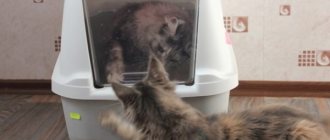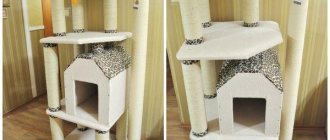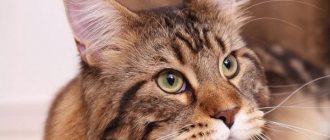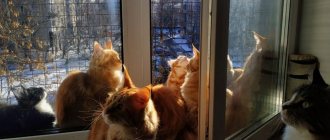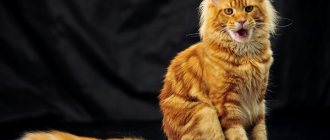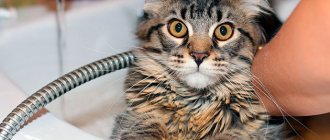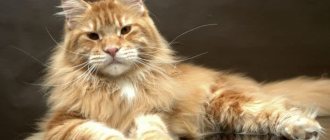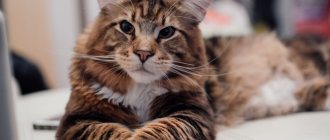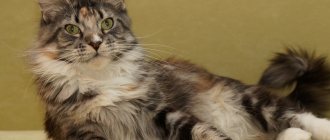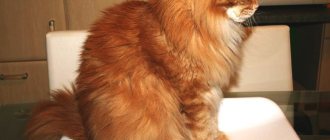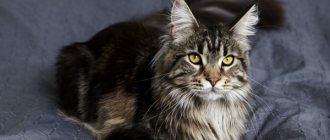General dietary recommendations for Maine Coons
Large semi-long-haired Maine Coons, despite their menacing appearance, have a good-natured and affectionate character, restrained and silent.
Read about Maine Coons, their upbringing, maintenance, character and more on our portal Mister Cat.
Due to their impressive size and some inherent health problems of the breed (weak heart, heavy load on the skeleton and teeth), it is important to properly organize their balanced diet.
By the way, read the article about the proper diet for cats.
Rules for a healthy diet for Maine Coons
It is worth considering that adult animals eat a lot. To correctly calculate portions, you must follow these tips:
- Observe the norms of plant polysaccharides, as a kind of cell building material.
- Choose the right fiber for optimal gastrointestinal function.
- Avoid excess carbohydrates in food, so as not to exceed the critical weight for large pets.
- Ensure the optimal content of “good” fats in the food, because lipids are the source of energy for the cat’s body. With a lack of Omega-3 and Omega-6 fatty acids, problems with the coat may begin and various diseases will appear.
- Organize feeding with the correct content of animal proteins. The amount of arginine is especially important; it is precisely with its insufficient composition that disturbances in the functioning of the cardiovascular system are possible in animals of this breed.
- No less important for the healthy functioning of the heart is taurine, which the predator’s body is not able to reproduce on its own. In addition, with a lack of this element, retinal degeneration can occur.
- Do not forget about the importance of the presence of vitamin complexes and fat- and water-soluble additional minerals in the diet.
When organizing the nutrition of this large pet, it is important not to forget about the predatory natural way of life of this animal and provide the diet with complete meat products or dry industrial mixtures that are as close as possible in the composition of elements to the diet of wild ancestors.
Read the article about the composition of industrial cat food.
It is especially worth making sure that you feed your Maine Coon regularly at certain hours and keep your pet’s bowls for water and solid food clean.
Epilogue
Providing proper care for your Maine Coon is not too difficult, it is important to know how to do it correctly. The breed dictates its own dietary habits, so it is better to consult a veterinarian about what pets of this breed eat immediately after purchasing a kitten.
What to feed a Maine Coon
Week-old babies weigh up to 310 g, then with each month of life they add approximately 0.5-1 kg of weight, and starting from the age of six months, an increase of 2-3 kg of weight per month becomes the norm. A castrated cat at 3 years of age can weigh up to 12 kg, and a female cat can weigh up to 8 kg. It is better to check with your veterinarian about the weight norm, because any sign of obesity is a direct threat to the health and life of your pet!
Feeding Maine Coons with ready-made formulas
Feeding animals of this breed with ready-made industrial mixtures is the easiest way to organize proper nutrition for your pet.
These are wet canned food, spiders and dry food, which can be stored longer and are always available to the pet in the open if there is a bowl of water.
Maine Coons should be fed ready-made food, either super premium or holistic. In general, there are good premium foods, but in this case you need to study the composition very carefully.
You should not give Maine Coons wet food from cheap brands such as Whiskas, Kitekat, Friskas. Pets usually eat them with pleasure and quickly get used to the tastes, but it should be remembered that they do not contain high-quality meat and a lot of mineral salts. We also do not recommend feeding cats Royal Canin diets for this breed. Indeed, now everyone is buying them. But let's look at the composition. For example, Maine Coon Adult in sauce for cats over 15 months old. Screenshot from the official website:
- It is not specified what kind of meat is contained, how much of it, the phrase “meat by-products” - also no specifics, what quality they are, they may not be very good.
- In second place are cereals, again, without further clarification, they are poorly digested by cats and serve as a cheap filler. It is better that they are not in the stern at all, or at least not higher than fifth place.
- The composition contains protein extracts of plant origin, plant by-products - again, nothing good.
We can conclude that this is an economy class, although the manufacturer classifies it as premium. Of course, there are no dyes or preservatives, but Whiskas doesn’t have them either.
So what kind of wet food can you give? We recommend Animonda, Leonardo, Applaws, Bozita. The latter has wet food for large breeds, however, it contains unwanted cellulose.
Read the TOP wet cat food in each category.
If we talk about dry mixtures, today a certain rating of these feeds has been formed, popular both among experienced breeders and private owners:
- Leading the list is Wellness, a fairly new product on the market from American manufacturers. It contains natural salmon and tuna, meat and fish flour, a small content of plant components, such as peas, and no grain. Wellness® Indoor Health for Adult Cat is suitable for young adult cats, but there are also products for pregnant and lactating cats, and kittens with a high content of animal protein. The disadvantage of this holistic product is that it can not yet be purchased in Russia even in all online stores and at a very high price.
- Bosch Sanabelle Grande takes second place in the ranking. The German manufacturer classifies this product as a super premium class product, but it is made from products suitable for human nutrition, which meets the criteria of canvas. The composition is based on liver and poultry meat, rice, millet, and sorghum. Based on the content of components, it is optimal for the prevention of urolithiasis; the granules are large and pets really like it.
We also recommend Akana and Orijen food. Although they have a small selection of flavors, the quality is very high. Read the article review of food for cats and kittens.
Good food:
- Hill's Nature's Best™ With Real Chicken Adult Cat is made in the Netherlands. The mixture contains high-quality products - poultry meat, plant components are represented by oats, rice, potatoes, and corn. The protein content is high. Maine Coons love this mixture very much.
- Eukanuba Mature Care Formula for Cats contains many meat ingredients, but also contains grains. Maine Coons happily eat this dry mixture, although some pets have allergic reactions.
- ProNature 30 Adult for Cats - until recently, breeders considered this Canadian food one of the best products in terms of price-quality ratio. In addition, the pets always ate it with pleasure. The only thing is that since production opened in Russia at the beginning of 2021, the level of Pronature has decreased significantly and many breeders have begun to abandon this feed. Contains chicken, corn, peas.
Nutrition for a pregnant cat
A pregnant and especially lactating Maine Coon cat should receive a larger portion of food than a regular cat. The food should be varied and, most importantly, complete. Each stage requires its own changes in nutrition. Throughout this period, the cat should receive high-calorie food, proteins, proteins, and microelements.
In the first 2 weeks of the pregnancy, the size of the pregnant woman’s usual diet is increased slightly - by only 10%. This does not mean increasing the serving size; a cat’s stomach is small; you just need to increase feeding to 4-5 times a day. In the third week, it is worth increasing the diet by 50%, but you should not overfeed her. This can lead to obesity and complications during childbirth. After the 7th week, the cat’s appetite decreases, this is due to physiological processes. But you also need to feed the animal often, at least 3 times a day.
Each stage of Maine Coon cat pregnancy will require changes in the quality and quantity of food. The gestation period is 65 days, which is 9 weeks. During this period, a high-calorie diet rich in microelements, vitamins and protein is necessary.
Natural diet for Maine Coons
Most owners of animals of this large breed prefer natural products in feeding their pets. It should be remembered that at least half of the diet should consist of meat ingredients. The following components must be present in the diet:
- Meat and offal (stomachs, heart, liver) from poultry, mainly chicken.
- Beef in the form of meat and offal, preference should be given to low-fat varieties.
- Fermented milk products are low-fat cottage cheese, natural yogurt, kefir, fermented baked milk.
- Cheeses in the form of hard varieties.
- Cereals are porridges prepared according to special recipes from buckwheat and multigrain mixtures.
- Fresh and boiled vegetables - carrots, cabbage, zucchini, pumpkin, cucumber.
- Some types of sprouted grains and specially grown grass.
- Brewer's yeast and meat and bone meal, fish meal.
- Vitamin supplements, special pastes for removing hairballs from the gastrointestinal tract.
As an example of “marten porridge”, in which the majority of protein components are occupied, we can recommend the following composition:
- meat and chicken by-products – 80%;
- fermented milk products – kefir or cottage cheese – 5%;
- vegetable and green components (zucchini, pumpkin, cucumber, spinach, celery, carrots) – 5%;
- oatmeal or buckwheat – 10%.
Here is another composition of the “mustel” diet, which owners usually prepare for several weeks, divide into portions and freeze (in grams):
- beef kidneys – 500;
- beef liver – 500;
- heart (beef or veal) – 100;
- light beef – 100;
- necks and heads of chicken broilers – 100;
- beef or veal meat – 100;
- chicken stomachs or hearts – 1000;
- turkey fillet – 1000;
- pumpkin and zucchini – 1000;
- carrots – 500;
- kelp – 1000;
- wheat bran – 500.
By-products and meat, lightly boiled vegetables are passed through a meat grinder, the bran is poured with boiling water and infused. The finished mixture is packaged and deep frozen for three to four days.
Before eating, the package is defrosted and placed in bowls; the “kunya” porridge can be topped with natural unsweetened yoghurt or fermented baked milk, and pieces of hard cheese can also be added.
Vitamins and minerals
These components play a very important role in the nutrition of Maine Coons. Preference should be given to complex drugs, having previously discussed their composition and brand with a veterinarian.
Some pets may benefit from mono-supplements that contain only certain elements, such as calcium, phosphorus, iron, vitamins B or E.
Typically, the veterinarian will first evaluate the animal's urine and blood tests in order to select the appropriate composition of vitamin and mineral supplements.
These complexes are necessary for Maine Coon's natural nutrition; in ready-made industrial mixtures, as a rule, all vitamins, micro- and macro-additives are present in the required quantity and ratio.
What to feed a Maine Coon kitten at 2, 3, 4 months and later
The Maine Coon differs from other breeds in having an unusually long period of maturation and growth. Only the formation of the musculoskeletal system is completed by the 15th month of life, and the cat sometimes reaches full growth only by four years.
When raising kittens, it should be taken into account that they gain weight quickly; by the age of three months, the baby weighs at least 2 kg, which is at least twice as much as the cub of an ordinary domestic cat. Therefore, the kitten must receive sufficient amounts of calcium, phosphorus, and vitamin D for the proper formation of the skeleton, musculoskeletal system, and muscles.
In addition, massive jaws grow very quickly, which is another distinctive feature of the breed. The granules of dry food for kittens should have a predominantly cubic shape so that the load is uniform. In addition, in this case, babies are forced to carefully gnaw and chew food, which also promotes oral hygiene; plaque is well cleaned and tartar does not form.
The first dry complementary food is usually given to kittens once a month and its composition remains the same for up to six months, only the number and frequency of feedings changes.
Month-old kittens are also given natural milk, with preference given to goat milk. Or they are fed with ready-made dry milk formulas. At first, they are fed six times a day, supplementing the diet with cereals, meat and vegetables.
At 3-4 months, they are switched to eating four times a day; crushed poultry giblets, vegetable ingredients, and fermented milk products are introduced into the diet.
Six months to a year is the most active growth period for a Maine Coon kitten. If the baby is not gaining enough weight, then the diet is reviewed, changing the ready-made formula to a more nutritious one or supplementing the menu with seafood.
A new component is always introduced gradually, with careful attention to ensure that no allergic reactions or changes in stool occur.
Normally, the growth of a Maine Coon kitten per month during this period is 300-400 g.
Drinking water
Many cat owners mistakenly believe that their animals get enough moisture from their food. In fact, your cat needs to have 24/7 access to fresh water.
Lack of fluid provokes the development of serious pathologies, such as impaired renal function and a disorder of water balance in the body. The amount of water a Maine Coon should drink depends on the animal's diet. A cat eating dry food needs to replenish 250-300% of moisture, and natural vegetable or meat puree already contains liquid, but drinking is still necessary (at least 50% of the food weight).
This is interesting! It has been noticed that, regardless of the type of food and taste preferences, absolutely all Maine Coons drink a lot of water.
Nutrition for an adult Maine Coon
In nature, raccoon cats feed on small mammals, so even when kept at home, portions of a healthy, adult pet should be small and meals should be fractional.
At one time, an adult animal should eat 6-7 g of food in a few minutes. Feeding takes about half an hour a day.
Scientists have found that the Maine Coon, like the Siamese, eats somewhat faster than other cat breeds; for example, the Persian eats no more than 2 g per minute.
The structural features of the jaws require a special form of dry food granules; the pet should always gnaw and chew them thoroughly, never swallowing them whole. The diet must contain Omega-3 and Omega-6 fatty acids, taurine
Pets are considered adults from the age of 15 months, at the same time they are transferred to food of a different age category.
The cubic shape of the granules will greatly help to cope with cleaning the oral cavity, but to prevent stomatitis and gingivitis, periodontal disease, it is still better to brush your teeth once a day, first with a soft cloth (kittens), and then with a special brush and paste.
Dry food is selected based on the pet’s preferences; you can occasionally give high-quality wet spiders as a treat, correspondingly reducing the amount of the main product.
Research by scientists has shown that Maine Coons, due to their large weight, are prone to hip dysplasia (about 23% of animals suffer), so the owner must pay special attention to their diet. Only a high-quality diet containing polyunsaturated fatty acids will help the proper development and maintenance of the normal musculoskeletal system.
Heart pathologies are also common among representatives of this breed. The most common cases of hypertrophic cardiomyopathy occur when the left ventricle of the organ is overstretched. This is due to a natural mutation in the protein gene that is responsible for binding cardiac myosin. To exclude pathology, the kitten should also undergo appropriate tests and be examined completely. Sometimes the disease manifests itself only in adulthood, so an ultrasound of the heart should be performed once a year.
Foods that contain taurine, EPA and DHA in the right proportions can support the normal functioning of the heart of an adult Maine Coon.
Special food should be selected for pregnant and lactating cats. Experienced breeders from an early stage switch expectant mothers to kitten food with a high content of animal proteins.
Aging pets from about the tenth year of life also need special nutrition to prevent the development of chronic diseases. If we talk about dry industrial mixtures, Eukanuba has specialized lines for this age group: “Mature & Senior”, BioMill: “Cat Senior”, Perfect Fit: Senior, Bosch Sanabelle: Senior, Pro Plan: Vital Age 7+ Dry Chicken & Rice.
Mr. Cat explains: allowed and prohibited foods
In the case of a natural Maine Coon diet, you should listen to the advice of experienced breeders and be sure to include in the feeding diet:
- Chicken heads, tails, necks, wings, paws. These products are usually ground and given to pets after deep freezing as part of “marten porridge”; they contain many substances necessary for the healthy existence of a predator.
- Although pork is considered an unfavorable food for cats, occasionally Maine Coons should be given pork heart, as it contains a record amount of taurine. It is passed through a meat grinder, frozen and added to portioned porridge.
- Fermented milk products, especially cheeses, kefir and cottage cheese must be included in the Maine Coon's diet. You just have to watch the fat content.
- It is advisable to sometimes give marine varieties of fish: pink salmon, salmon, cod are suitable.
There is also a fairly extensive list of foods that are strictly prohibited from feeding Maine Coons:
- Viscous cereals with a lot of milk have a bad effect on the gastrointestinal tract and often cause diarrhea.
- Baked goods, pastries, pies, cookies, preserves and jams, other sweets and chocolate are prohibited.
- Boiled poultry bones should be excluded from the diet; it is the fragments of tubular elements that can injure the gastrointestinal tract.
- Pork should be completely removed from the diet; it is a heavy meat product that is dangerous for cats in many ways (except for the heart).
- Potatoes, beans, beans, peas, and tomatoes are not allowed as vegetables. They cause increased gas formation and diarrhea.
- River fish should not be given, as there is a high risk of infection with parasites. In addition, it contains many small and sharp seeds.
- Whole cow's milk is not recommended in the diet of adult animals.
- It is also worth excluding sausages, sausages, smoked, pickled, canned, salted, hot and spicy foods.
In strictly limited quantities, they give the yolk of raw chicken eggs (the white is prohibited), olive oil (and other vegetable oils), poultry liver, and seafood.
The most complete types of meat for Maine Coon are considered to be turkey, rabbit, beef, and lamb. Chicken is healthy, but feeding this bird alone is not enough in terms of animal protein content.
Calculation of the diet of an adult cat with examples
The Maine Coon nutrition table, calculated by month, is no longer relevant by the age of puberty. From this period, each cat develops individually.
If feeding is done with industrial dry or wet mixtures, information about the quantity of products should be obtained from the instructions, which are usually placed on the packaging.
Natural homemade food cannot be issued according to the recommendations of the manufacturing brands. In this case, the balance of substances in the diet is calculated using the usual “human” table.
The most important component in the diet of an adult Maine Coon is protein. Food containing it should occupy from 90 to 95% of the portion. Just remember that a cat needs a daily protein intake within 30% of the total amount of food:
- beef - 100 g contains 18.5-20 g of animal protein;
- rabbit – 100/21;
- chicken (the lower the category, the more protein) – 100/18.2-21;
- turkey – 100/19.5-21.5;
- peas – 100/5;
- Brussels sprouts – 100/4.8;
- beans – 100/3;
- carrots – 100/1.3;
- pink salmon – 100/21;
- crucian carp – 100/20.7;
- sea bass – 100/18.2;
- sturgeon – 100/16.4.
Cattle by-products and poultry are considered separately. Their protein value varies from 12 to 18 g per 0.1 kg of product.
The menu for an adult Maine Coon is compiled taking into account proteins, fats and carbohydrates, which together should fit into the weight of 0.3-0.4 kg of the finished product (depending on the physical condition of the cat):
- 120 g chicken + 60 g rice + 30 g carrots – boil, chop, mix and offer to Maine Coon for breakfast.
- Grate 50 g of raw frozen beef on a coarse grater, 30-40 g of low-fat cottage cheese for dinner.
The difficulty of natural feeding lies in the need to constantly count nutrients. But this disadvantage is compensated by the opportunity to diversify the menu and give the cat truly healthy food.
